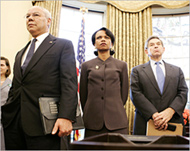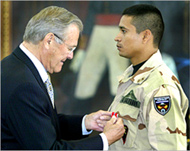US team reflects Bush’s world view
The resignation of Secretary of State Colin Powell and the appointment of Condoleezza Rice as his replacement have stirred speculation over the direction of the Bush administration’s foreign-policy agenda in the second term.

Many political analysts, however, say it is still too early to tell whether significant changes on major issues ranging from the Middle East peace process to relations with Iran are imminent.
“I don’t think we’re going to see a much different course of action, I just think you’re going to see a much less public airing of the course of action,” Jay Farrar, vice president for external affairs at the Center for Strategic and International Studies, says.
Rice is widely believed to have a much closer relationship with President Bush than Powell, whose disagreements with the administration over certain aspects of the war in Iraq became common knowledge in Washington despite concerted efforts to present a united public front.
More reflective
Powell’s departure gives Bush the opportunity to install a diplomatic team more consistent with his own world-view, according to Peter Singer, a national security fellow at the Brookings Institution.
 |
|
The Iraq mess leaves little room |
“I think you’re going to have a policy that is more reflective of the president’s vision,” Singer said.
Whether that vision includes a different strategy in dealing with Iraq, Iran or the Israeli-Palestinian conflict remains to be seen.
Although several experts downplayed the possibility of any radical shift in US policy towards the Middle East, Singer said Rice would be viewed more favourably by administration hawks in the White House and the Pentagon.
“You have someone who seems to be more sympathetic to the neo-conservative cause, more unilateral,” he said.
Unlike Powell, Rice’s close ties to the president means world leaders will know she has the weight of the White House behind her during negotiations on key issues.
“She clearly has the president’s ear and in that respect she wields a tremendous amount of power,” Farrar said.
Power matters
As the national security adviser, Rice often kept her own foreign-policy outlook a matter of some ambiguity, yet a lengthy 2000 article she wrote in Foreign Affairs magazine offered a revealing glimpse of her thoughts at the time on diplomacy and the appropriate use of American power.
“I think you’re going to have a policy that is more reflective of the president’s vision” Peter Singer, |
In the piece, Rice argued that “power matters”, and suggested it should be used unilaterally when the US “national interest” is at stake.
She also criticised the Clinton administration for pursuing various multilateral agreements without considering a narrowly defined set of guidelines for American security.
“Neither is it isolationist to suggest that the United States has a special role in the world and should not adhere to every international convention and agreement that someone thinks to propose,” she wrote.
Cabinet shifts
Rice goes on to assert that the US should restrict its use of military force to regions of strategic interest, saying the military should not be used for nation-building purposes, as is currently the case in Iraq.
 |
|
Rice is viewed more favourably |
“[The military] is not a civilian police force,” she wrote. “It is not a political referee. And it is most certainly not designed to build a civilian society.”
While cabinet shifts have garnered the lion’s share of attention thus far, Bush’s decisions on which team members to retain are equally significant, experts say.
Some predicted the imminent departure of Secretary of Defence Donald Rumsfeld, who has been criticised in recent months for his handling of the situation in Iraq.
Yet Rumsfeld, along with his core group of deputies, appears likely to remain at the Pentagon for the foreseeable future.
No time for change
Several analysts said Rumsfeld wanted to keep the job long enough to achieve his goal of modernising the military’s infrastructure, transforming the armed services into a more high tech and agile fighting machine.
“[The military] is not a civilian police force. It is not a political referee. And it is most certainly not designed to build Condoleezza Rice, |
The decision to allow him to stay, however, could be more indicative of Bush’s unwillingness to signal any hint of uncertainty over the current strategy in Iraq, according to John Hulsman, a fellow at the Heritage Foundation, a conservative thinktank.
“Even if you have doubts, now is not the time to express them,” Hulsman said. “I think that is the Bush feeling on that.”
However, Bush supporters who might expect the administration to pursue an even more aggressive foreign policy in the second term could be disappointed, according to Edward Luttwak, a fellow at the Center for Strategic and International Studies.
Centre of gravity
In a recent editorial for The New York Times, Luttwak said US presidents often reverse course on foreign policy in their second terms.
 |
|
Rumsfeld is likely to run Defence |
“Curiously enough, however, re-elected presidents tend to disappoint their most enthusiastic followers by changing direction: they go right if they started on the left, turn dovish if they were hawkish, and in all cases converge towards the centre of gravity of American politics,” Luttwak wrote.
It is difficult to predict whether Bush will follow such a pattern in handling the most critical issues on the global agenda.
Conventional wisdom seems to suggest the president will be too preoccupied by US commitments in Iraq to explore any dramatic shift in US policy elsewhere.
“There just isn’t room for much adventurism there,” Hulsman said.
Facts on the ground
|
“Re-elected presidents tend to disappoint their most enthusiastic followers by changing direction: they go right Edward Luttwak, |
While Iraq is sure to be the dominant focus for the administration in the near future, most experts believe the policy there will be unaffected by cabinet shifts or any other bureaucratic changes.
“I would say that the facts on the ground will matter more than American policy,” Gideon Rose, managing editor of Foreign Affairs magazine, said.
With respect to the Israeli-Palestinian conflict, it appears likely that the administration will make some effort to re-engage in negotiations between the two parties.
“There will be some kind of diplomatic push,” Rose said, adding that much depends on whether Bush is “prepared to push the Israelis”, as well as the Palestinians.